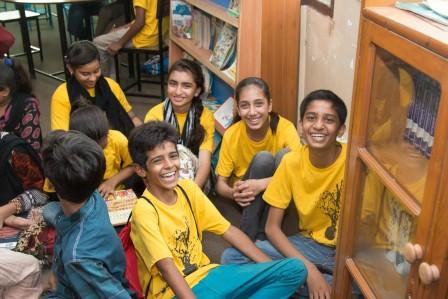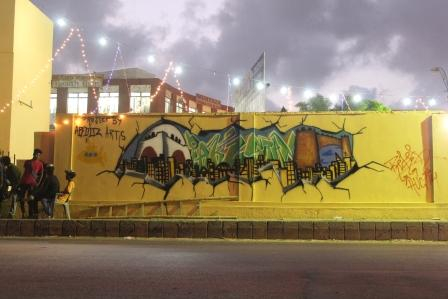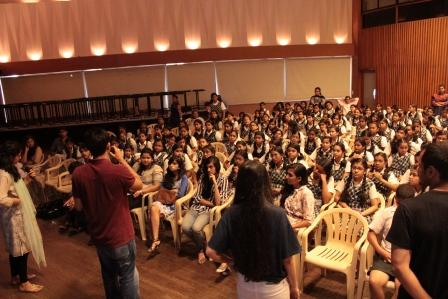
Pakistan has been engaged in an intense battle against extremism for a very long time. Evidence of dissent is often found in inflammatory sectarian messages and political propaganda spray-painted across its urban centres, or the more insidious indoctrination of the youth. In reaction, there is a strong wave of social consciousness and growing number of civil society initiatives aimed at changing attitudes and spreading a message of tolerance, peace and universal brotherhood.
A tale of redemption
Inspired by his experiences, Lahore-based Gauher Aftab has written a three-part comic book that is being distributed in schools to combat extremism. “The Paasban series takes young readers on a roller-coaster ride through a reflection of today’s dangerous world,” he tells GN Focus.
“In a story of friendship, sacrifice and redemption, young people will see how extremist recruiters appeal to vengeful and violent emotions, twist religious teachings and rationalise even the most inhuman of crimes. Through the eyes of our characters, the audience will follow the path to radicalism, endure the pain and suffering that is the inevitable cost of succumbing to hate, and find out if there can ever be any redemption for those so far gone.”
Aftab nearly joined a militant group himself. He says he was brainwashed in college by his religious studies instructor, a veteran of the Afghan civil war, who convinced him to join militants in the disputed region of Kashmir. “There is essentially no counter-narrative to the ideology of hate and violence espoused and widely disseminated by extremist groups,” he says. “So, while there is widespread condemnation of tragedies like the December 16 terrorist attacks on the Army Public School in Peshawar, which killed more than 150 children, there is no path to delegitimise the religious authority of these groups.”
The Paasban series presents Islamic teachings of tolerance in a thrilling story with captivating visuals. Over 15,000 free copies have been distributed at low-income public schools in Punjab. It is also available on Cfxcomics.com and via the CFx Comics app.
“Graphical storytelling has great potential to engage kids, especially as the visual experience helps overcome barriers of reading ability and comprehension,” says Aftab. “A gripping story has more potential to change beliefs than a force-fed awareness campaign, and that’s why initial research has shown the Paasban series exceeding behaviour change expectations.”
Meanwhile, although graffiti is usually seen as a social menace, Abdoz Arts paints a positive spin on the walls of Karachi. The initiative was founded by three college friends, who woke up one morning to find their neighbourhood school covered in extremely abusive writing. “Our goal is to reclaim our public spaces marred with sectarian and political wall chalking with thematic artworks,” Co-founder Humble Tariq tells GN Focus.
“These artworks are intended to bring out the lost positive side of our society and give a break to the citizens. Public walls are a great asset to a country and a communicative medium for the masses. If we replace it with something positive, we can hope to develop a positive attitude among the people as well.”
Tariq says the artists come from various backgrounds. “Many have gained an international reputation with their work, while others are students from different universities.”
Abdoz Arts is now taking this vision across the city through its partnership with Indus Valley School’s I Am Karachi initiative and the Reimagining the Walls of Karachi project.
Re-evaluating history
In Lahore, three young Pakistanis believe history also needs to be re-evaluated for a promising future. Qasim Aslam, Ayyaz Ahmad and Zoya Siddiqui hope schoolchildren in Pakistan and India will critically analyse, evaluate and question significant events in their nations’ shared heritage. “The question The History Project is trying to answer is, can we teach our future generations — i.e. students in India and Pakistan in their formative years — to think critically about the information that implicitly shapes their identity, and empower them to reach their own conclusions?” explains Ahmad.
“We’d like to believe the answer is yes.”
He tells GN Focus the ultimate goal is to build a generation that is more aware and able to think critically and understand that there is always another side to every story. “Future generations shall also be able to deal with their internal issues in a more empathetic and tolerant manner. Do we want [them] to consist of individuals who have the capacity to deal with various issues, domestic and international, in a meaningful way? If the answer is yes, then that’s exactly how we think The History Project shall benefit not just these two but any nation.”
The project will launch its next book in a few months, accompanied by lesson plans and workbooks to assist students as well as teachers in engaging more deeply with the content and concept of learning history as a perspective. This will yield The History Project certification endorsed by Seeds of Peace and the International Youth Foundation. “We are planning to launch the second book in Lahore, Mumbai and New York and engage with 50 schools, around 10,000 students, on both sides of the border,” says Ahmad.
Connecting people
Rabtt also harnesses the power of critical thinking. The social enterprise was founded in 2011 by Fulbright scholars Imran Sarwar and Aneeq Ahmed Cheema. “Rabtt, which literally translates into connection, is an attempt to engage with students from public as well as private schools in Pakistan at a personal level and foster in them the desire to think critically,” Hammad Anwar, Communications Director, tells GN Focus. “We are working towards a more empathetic Pakistan, laying the foundations of an education system that encourages critical thinking, fosters creativity and gives individuals the confidence to self-actualise. We believe that only by connecting with individuals and information in a meaningful way can we create long-lasting change; hence Rabtt — the connection.”
The organisation believes that extremism, intolerance and hatred can only be countered by education. “It is the only way that we can inculcate those values that can lead us to the path of peaceful coexistence,” says Anwar.




